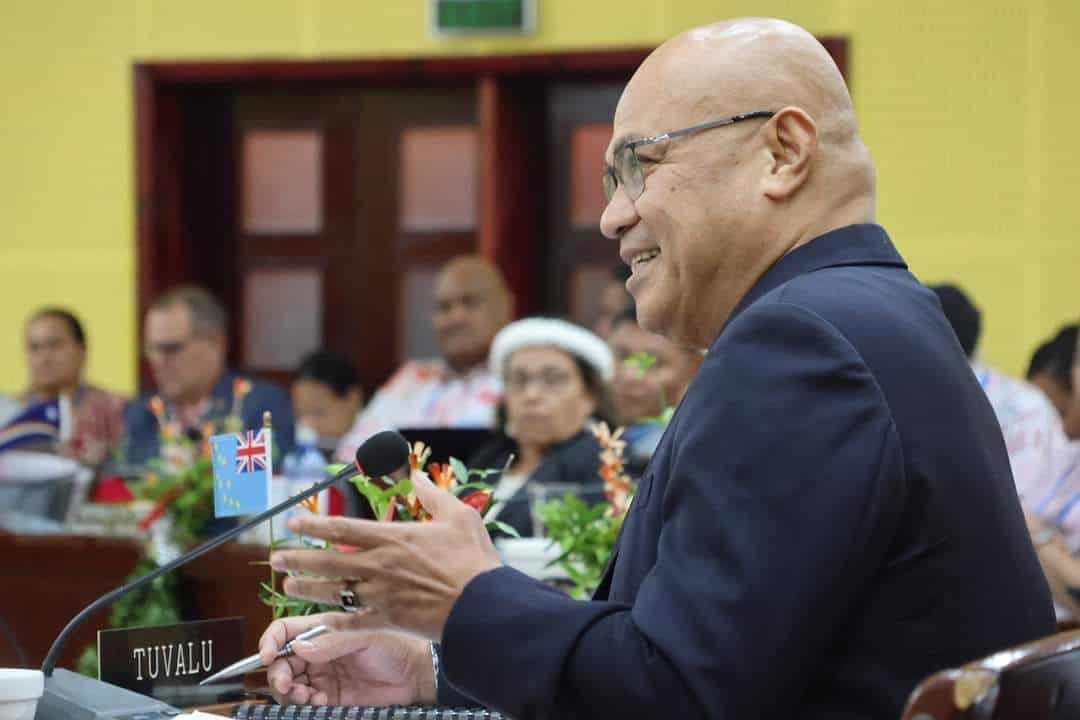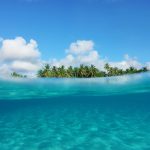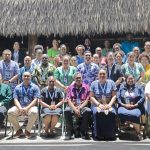By Nic Maclellan
As the oceans face devastating change from climate change, biodiversity loss and pollution, Pacific governments are preparing for the Third United Nations Ocean Conference, to be held in France in June 2025.
Speaking on the sidelines of last week’s Pacific Islands Forum in Tonga, Prime Minister of Tuvalu Feleti Teo spoke of the importance of the oceans’ agenda for the region.
“The people of the Pacific are people of the ocean and the ocean defines and characterises the Pacific,” Teo said. “The ocean is integral and fundamental to the character, the cultural heritage and the way of life of the Tangata Pasifika.”
Taking office after elections last January, Teo attended his first Forum leaders retreat on the island of Vava’u on Thursday. However, the Tuvaluan leader has long experience in Pacific regional oceans policy, as a former Forum Deputy Secretary General, Director General of the Forum Fishery Agency (FFA) and executive director of the Western and Central Pacific Fisheries Commission (WCPFC).
Teo acknowledged that, taking office in Funafuti, “I regret to confess that there is no national ocean policy for Tuvalu, a major and unexpected surprise for me. My new administration is committed to strengthening oceans policy through policy coherence and financing. I have committed to developing a national ocean policy for Tuvalu.”
Developing both national and regional co-ordination of oceans policy is backed by the Office of the Pacific Islands Commissioner (OPOC) and Pacific Oceans Alliance. Since 2011, previous Forum Secretaries General Dame Meg Taylor and Henry Puna served as the region’s oceans’ commissioner. However, with the 2023 restructuring of the Forum, OPOC is now astand-alone institution, with veteran Marshallese diplomat Dr. Filimon Manoni taking the role at the new OPOC headquarters in Koror, Republic of Palau.
“Robust co-ordination of oceans governance policies is critical, given the multitude of players in the ocean space,” Prime Minister Teo said. “So Tuvalu supports the use of regional offices like OPOC to develop and strengthen effective regional ocean mechanisms.”
At last week’s 53rd Forum leaders meeting in Nuku’alofa, United Nations Secretary General António Guterres was a key international guest. In a series of speeches, he detailed the many ways that the ocean is affected by climate change.
Launching a World Meteorological Organisation (WMO) report on sea-level rise, Guterres said: “Global average sea levels are rising at rates unprecedented in the past 3000 years. The ocean is overflowing. The changes here in the Pacific region are visible since my last visit.”
The WMO study reveals that the average rate of sea level rise has more than doubled since the 1990s. Relative sea levels in the south western Pacific have risen even more than the global average – in some locations, by more than double the global increase in the past thirty years.
“Around the world, rising seas have unparallelled power to cause havoc to coastal cities and ravage coastal economies,” Guterres said. “The reason is clear: greenhouse gases – overwhelmingly generated by burning fossil fuels – are cooking our planet. And the sea is taking the heat – literally. It has absorbed more than 90 percent of global heating in the past fifty years.”
Setting goals for ocean protection
In 2015, the United Nations replaced the 2000 Millenium Development Goals with revisedSustainable Development Goals (SDGs). In preparation for the change, Pacific diplomats worked for years to ensure that there was a specific goal on the oceans. This was achieved as Sustainable Development Goal 14 “on the conservation and sustainable management of oceans and seas” (SDG14).
As Fiji’s Ambassador to the United Nations, Peter Thomson played a crucial role in developing the new global objective.
“SDG14, to sustainably use the resources of the ocean, exists because of the Pacific Small Island Developing States in New York, and their determination to have an oceans SDG within the UN’s 2030 development agenda,” he said. “As one of the Ambassadors involved, it would not exist if it hadn’t been for our absolute persistence. No agenda without the ocean being in it! The UN Oceans conferences became the means by which we kept SDG 14 honest.”
On the international stage, Pacific nations are also working to strengthen the Convention on Biological Diversity (CBD). At the last CBD summit in Montreal, member countries set an ambitious target to conserve 30 percent of terrestrial, inland water, coastal and marine areas by 2030 – a vision known in shorthand as “30 x 30”.
Today Ambassador Thomson serves as at the United Nation’s Secretary General Special Envoy on the Ocean. He says the CBD target is of vital importance, given the unexplored biodiversity of the world’s oceans.
“I’m kind of obsessed by 30 x 30 at the moment,” Thomson said. “Our earth scientists have told us that if we don’t protect 30 percent of the planet by 2030, we’re going to see a cascading loss of biodiversity on this planet. That has existential implications for our species as well. We’re way behind in getting to that 30 percent protection.”
“The ocean covers 71% of the planet – we’re actually Planet Ocean, not Planet Earth. 95 percent of the living space is in the ocean so it has to be a big part of this 30 x 30 push.”
Global oceans diplomacy
“The people of the Pacific are people of the ocean and the ocean defines and characterises the Pacific,” Teo said. “The ocean is integral and fundamental to the character, the cultural heritage and the way of life of the Tangata Pasifika.”
Following meetings in New York (2017) and Lisbon (2022), the third UN Conference on the Ocean will be hosted by France in Nice in June 2025, preceded by a major global conference on ocean science and a summit in Monaco on finance for the Blue Economy.
Olivier Poivre d’Arvor is Special Envoy of the President of France for the Ocean Conference. Poivre d’Arvor attended the Forum leaders’ meeting in Nuku’alofa, to raise awareness of the conference and urge participation from Pacific Small Island Developing States.
The French government has proposed three core priorities for a series of conference next June, including the ratification of key multilateral oceans treaties, global co-ordinate on ocean science, and developing innovative sources of funding for ocean protection.
Poivre d’Arvor called on all Forum states to move ahead with the ratification of the new BBNJ Agreement – a global treaty on the regulation of the high seas outside national Exclusive Economic Zones (adopted in June 2023, the official title is the ‘Agreement under the United Nations Convention on the Law of the Sea on the Conservation and Sustainable Use of Marine Biological Diversity of Areas beyond National Jurisdiction’, so you can see why they say BBNJ!).
“We need 60 ratifications of BBNJ, so please help us to get there,” he explained. “Secondly, we have to mobilise funding for sustainability in oceans and third, we need to better co-ordinate and serve marine science knowledge for better decision making, by creating a new platform between ocean science and policy.”
Next year, France will host the Third United Nations Ocean Conference from 09-13 June, preceded by three inter-connected meetings: the One Ocean Science Congress (04-06 June); the Ocean Rise and Resilience Coalition of cities and coastal regions (07 June) and the Blue Economy and Finance conference (07-08 June).
Palau a focal point for action
Pacific Islands Forum member countries represented at the United Nations have all signed the BBNJ Agreement, but it must be ratified by 60 countries before it can enter into force – so there’s a big diplomatic push to get countries to act before the Ocean Conference in Nice.
In January 2024, the Republic of Palau took pride of place as the first nation in the world to ratify BBNJ (followed by the Federated States of Micronesia in June).
Addressing the 4th Small Islands Developing States conference in May, Palau President Surangel Whipps Jr said: “As the Co-Chair of the UN Ocean Panel, we know of the ocean’s promise as a solution for us SIDS. Palau is incredibly proud to be the first country to have ratified the BBNJ Treaty. Twenty years in the making, we now have an instrument as a global community for protecting biodiversity in the high seas.”
In Tonga last week, Palau’s Permanent Representative to the United Nations Ambassador Ilana Seid noted that “Palau is the proud new home of the Office of the Pacific Oceans Commission, and has been mandated to be the implementation arm of the Pacific for BBNJ. We’re using this regional architecture to connect the High Seas and international waters with our regional oceans so we can figure out ocean governance for our countries.”
She also highlighted the need for financial commitments to fund the scientific research and policy change to implement ocean sustainability. As the incoming chair of the Alliance of Small Island States (AOSIS) in 2025, Ambassador Seid encouraged regional involvement in the Blue Economy and Finance Forum.
“Sustainable Development Goal 14 is the least funded SDG at the United Nations,” she said, “so the Blue Economy and Finance meeting is an event where we’ll be championing more finances and resourcing into the oceans. We’re talking about how to unlock finance for Small Islands, who control 30 percent of the world’s oceans but get very little in terms of funding – for example how can capital markets create Blue Bonds.














